Existing User Log In
New User Registration
Register for a free account to gain full access to the VGChartz Network and join our thriving community.



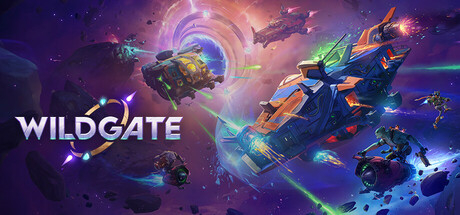

America - Front


America - Back

Moonshot Games
Shooter
 (Add Date)
(Add Date) (Add Date)
(Add Date) (Add Date)
(Add Date)
| Owners: | 0 |
| Favorite: | 0 |
| Tracked: | 0 |
| Wishlist: | 0 |
| Now Playing: | 0 |
On March 10th, 2022, Rare went through with a dreadful decision for Sea of Thieves: shuttering The Arena. Granted, it didn't garner much attention – think inverse Fortnite/Fortnite Battle Royale story, but with perhaps a bit more patience, with more tweaks and refinements, it could've avalanched into overnight popularity. Lamenting another game's secondary mode seems like a suspicious segue, almost as if I'm desperately hawking an old article about it (see here for more details). But there's more to it. The way Wildgate fuses Thieves' multi-layered combat tempo, Arena's "extraction-lite" template, and whizz-bang pulpy sci-fi is an insanely specific niche to roll the dice on. In that light, Moonshot Games is a fitting name for this freshman developer.
Now, granted, extraction shooters – particularly within sci-fi – have been gaining steam recently. Anyone familiar with them will get the gist: five four-man teams are plopped into a sector of what's only known as "The Reach." The primary objective is to find the Artifact and escort it to the Wildgate. Whoever does that or is the last ship standing wins the match; alternatively, The Reach wins if no ship is left standing nor secures the artifact after forty-five minutes. Given the sheer size of Wildgate's 6x6 grid map (several kilometers in both directions), alongside its RNG, there are two ways of finding the Artifact: probing and scanning for the vault's location or waiting for the Wildgate to open, which'll then ping its exact coordinates.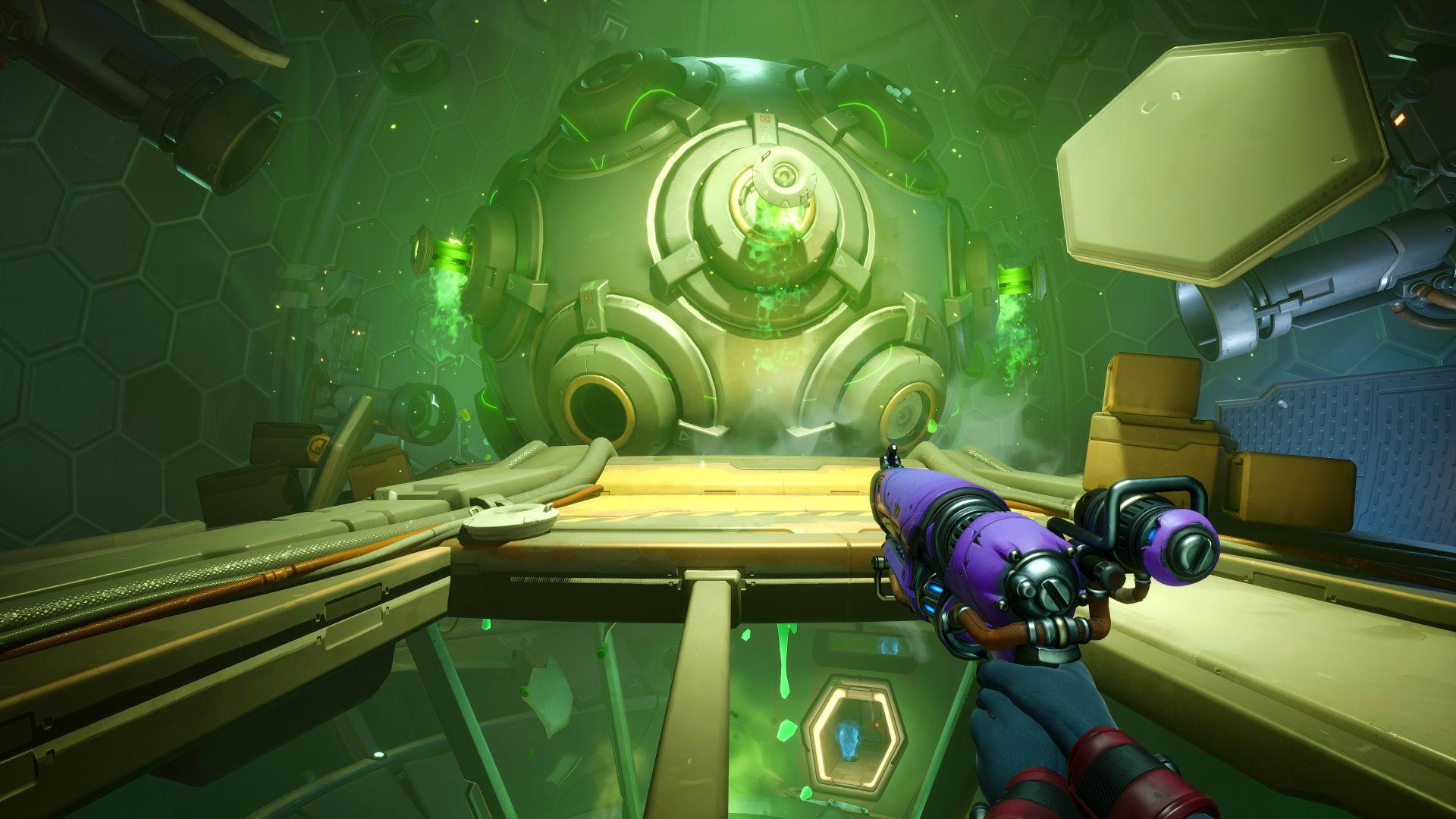
Although there are disparate Heroes (or "Prospectors", as they're called) and Spaceship designs - each with their own unique advantages - teams start on a relatively similar footing. Virtually every beginning places teams near a low-difficulty outpost to quickly finish and raid for loot. The idea early on is to scrounge for nearby supplies as quickly as possible, be it more ammo, ship gun enhancements, or unique ship upgrades, such as stronger shields or enhanced maneuverability, to prepare for tougher engagements. Like other extraction shooters, getting through these mini-dungeons means facing off against disposable enemy AI, each faction being reflective of a pulpy sci-fi cartoon.
Admittedly, Wildgate's on-foot bouts are like Thieves' own shooting & sword-fighting: simplistic by design. There are a few little nuances besides pulling down the trigger and aiming on occasion; every character gets two secondary abilities that are either passive or limited-use consumables, which can be replenished either at stations scattered around the world or by teleporting back to your ship. Just like with certain ship designs and characters, several weapons can only be unlocked by investing towards specific xp reward categories. While there's a modest variety of weapon types and secondary items to play with, the shooting foundation overall is merely serviceable. Hunt: Showdown this most certainly is not.
There's nothing wrong with reflexively wishing for closer parity to Hunt's punchy shooting and polish, but that'd also miss the point here. Again, similar to Rare's swashbuckling IP, paring away certain modernizations is meant as a balance to the heightened complexities of ship combat and management. For all intents and purposes, the dynamic blend of ship-to-ship combat, mixed with on-foot raiding parties, has left the ocean and been transplanted to space. Hell, the ships themselves operate more like bulky submarines flying through the Aether than the actual Newtonian physics of space (a la The Expanse series).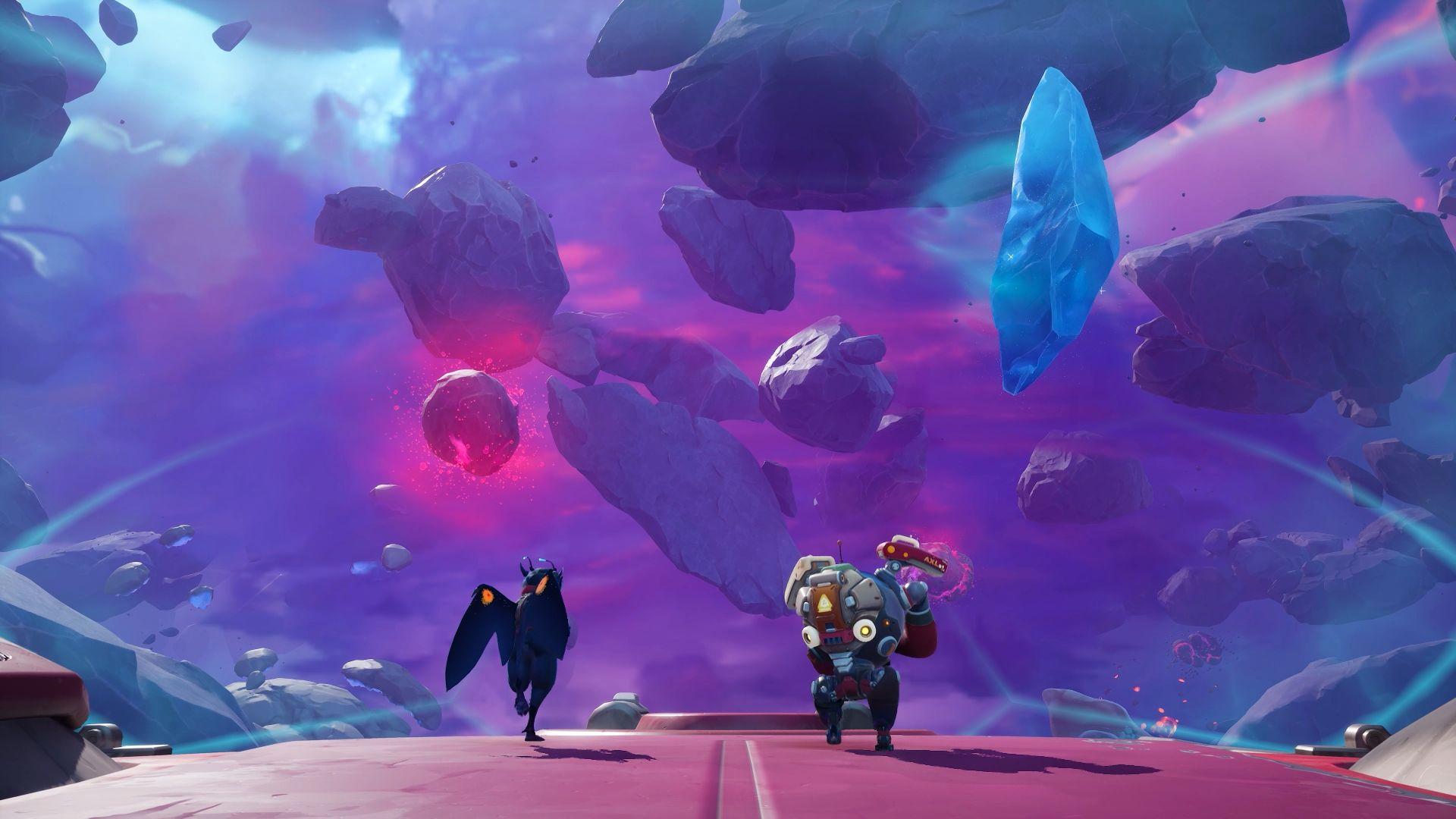
Crafting a detailed physics model where every fired shot alters ship direction would run against Moonshot's intentions, especially when juggling so many other factors. The basics fall into place quite easily:
It leans more towards a – shall we say – "sim-lite" approach; its underlying systems feel appropriately weighty and consistent across ship designs, but the helm isn't cluttered with a built-in radar scanner or a litany of buttons and levers. It's not meant to be like the interior of a mech suit.
Welded alongside flying the ship is the moment-to-moment managing of it. One of the toughest dilemmas with extraction shooters is the downtime surrounding those electric ten-ish minutes of two or more teams duking it out over the big prize. Wildgate's case is one of the best at occupying a player's interest – however minute – whilst traveling between micro-dungeons. Since afterburners need fuel and ship reactor health gets replenished with ice, it's imperative to mine as many nearby fuel or ice asteroids as possible for potential danger on the horizon. There's this smooth rhythm of probing the surrounding area, whipping out your omni-tool to mine something, and teleporting back to drop it off at the ship's distribution center.
Even though the tutorial itself is a bit limited, perhaps you can see how all of these different systems take shape. After the first few minutes, potentially mission-critical decisions can show up. Which option is most incisive: a direct conflict early on or a tactical retreat for more resources? It could be beneficial to knock out an opponent early; on the other hand, it can drag out into a battle of attrition where you spend abundant resources for paltry ship upgrades. Tactics only increase in complexity when considering the combination of ship-to-ship cannoning and on-foot raiding parties. One jackass character with an invisibility trait could sneak onto your ship, assassinate the helmsman, kill a gunner for good measure, filch a ship upgrade, teleport back to their ship, and install said stolen upgrade in less than 30 seconds. These sharp vicissitudes of fortune can happen so fast.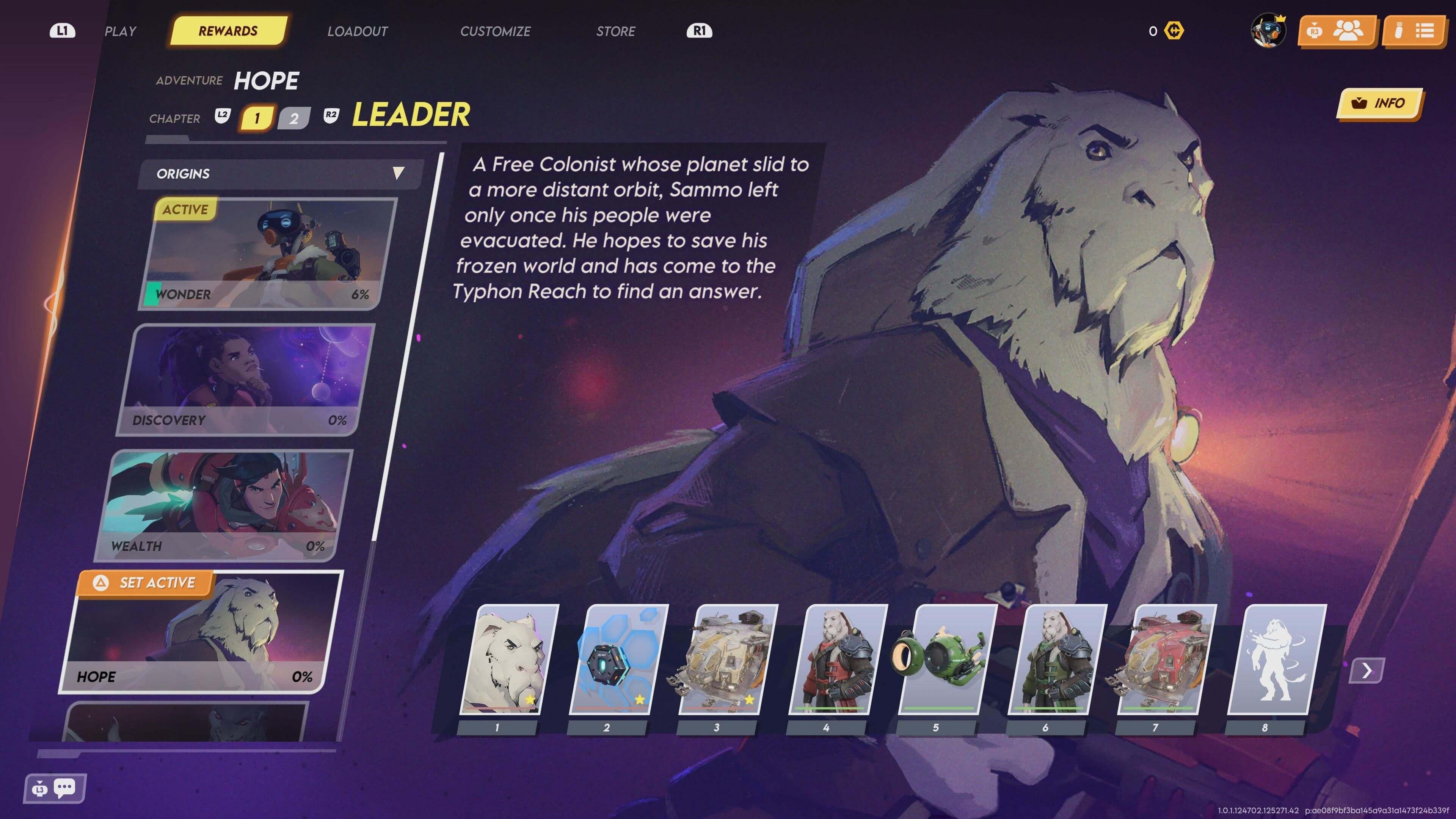
That only scratches the surface of its panoply of potential dilemmas. Alongside every Prospector's unique character trait(s) and two special items from your loadout, your ship type will also influence how to attack. Every ship has at least one door that can be opened from the outside, but only the Bastion limits that to the top ceiling door. Of course, that sense of safety goes out the window (ironically) should an enemy ship's cannon blow open one of the other door jambs; past that, it's also critical to address because of oxygen decompression and potential fires spreading throughout the cabin. It's not merely about deft piloting skills under pressure, but also the need to carefully split time between flying, managing potential raids, and fixing anything in need of repair with your Swiss omni-tool. Part of me wants to expound on more nuances, but a large part of the charm stems from heuristic discovery.
For the sake of comparison (again), all of these interlocking systems are visually represented with Thieves' type of soft-texture aesthetic – for better or worse. In some respects, it feels like something closer to a semi-grounded veneer could've made certain images truly dazzle; that said, the Fortnite-esque appeal is also beneficial for maximizing draw distances, which is central to player tactics. It's easy to respect how a more simplistic art style, alongside Maclaine Diemer's respectable-but-limited soundtrack, captures a broader all-ages appeal. Even with those considerations, it still feels like the team could've gotten more creative within this aesthetic. The original Star Wars trilogy's used-tech approach for ship exteriors and interiors seemed like a better fit here.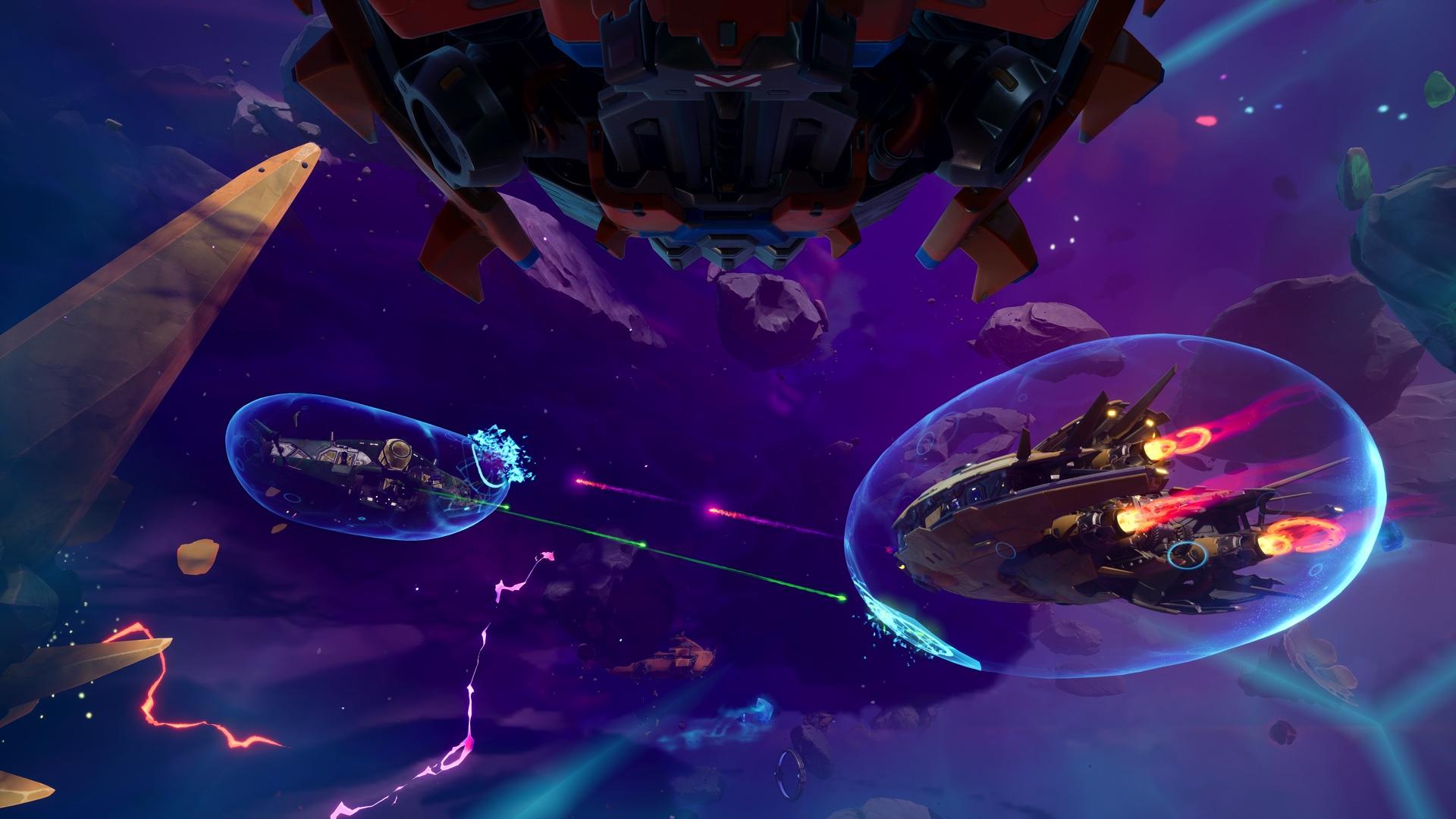
Outside of the game proper, a common concern with many extraction games is the cost-value ratio. In Wildgate's case, it is a middle-market title ($30) with a key emphasis on its Artifact Hunt mode, split between fighting other people or AI; beyond that, there's only the tutorial and firing range at the moment. Layered alongside that is the usual Games-as-a-Service (GaaS) trope of a deluxe "Renegade Edition" ($50) - which I was given - alongside microtransactions and a storefront. Even for a relatively new publisher in the scene, Dreamhaven Inc. seems too comfortable with some shifty schemes. I can sympathize with anyone avoiding it on principle; with all of this considered, however, it's genuinely easy to disregard those elements for the free Battle Passes (or "Adventures") here.
More so than just being an answer to a unique multiplayer mode now lost in time, Wildgate genuinely earns a spot amongst today's best extraction games. By fusing the multi-layered combat dynamics from the likes of Sea of Thieves with sci-fi, it's created some of the most intense & protracted multiplayer bouts in recent memory. But beyond the flash and thrills, what Moonshot Games best accomplishes is a level of measured control few developers manage – least of all the first time through. That may not discount some specific misgivings altogether, but it's nevertheless among the most exhilarating games this year has to offer.
Contractor by trade and writer by hobby, Lee's obnoxious criticisms have found a way to be featured across several gaming sites: N4G, VGChartz, Gaming Nexus, DarkStation, TechRaptor, and Cubed3! He started gaming in the mid-90s and has had the privilege in playing many games across a plethora of platforms. Reader warning: each click given to his articles only helps to inflate his Texas-sized ego. Proceed with caution.









